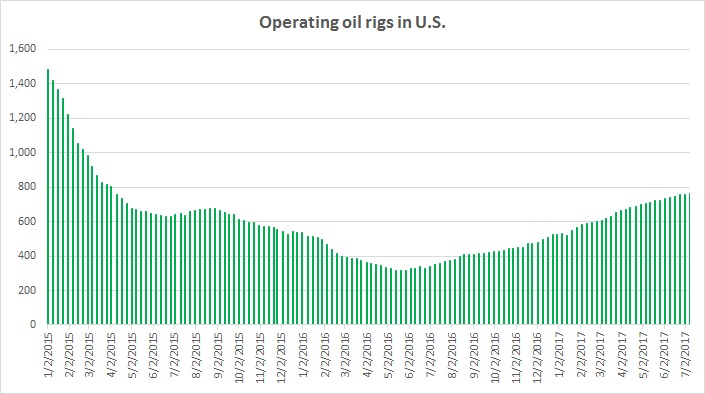After the numbers of operating oil rigs declined in the previous week, the operating oil rigs posted a rise for the 24th time in last 25 weeks. The increasing numbers of operating rigs, as well as increasing production, have been raising concerns that the U.S. shale oil producers which were able to cut their production cost dramatically over the past years are now a low-cost global competitor and would continue to undermine the OPEC agreement to cut supplies. Last month, OPEC producers and 11 participating non-OPEC countries including Russia formally ratified the agreement first drafted last November to cut supplies by 1.76 million barrels per day for an extension. The new agreement extends the production deal for nine months until March 2018. However, the latest oil market report from OPEC showed that production increased by 336,000 barrels in May, thanks largely to two exempted countries, Libya and Nigeria.
Despite the agreement, the oil price has suffered a major selloff on the day of the agreement and was down around 3 percent by the end of the day. It is still continuing on its downward trajectory and last week saw the comeback fall a victim of the supply glut. In the first half of this year, crude oil price declined by around 15 percent, which is its worst H1 showing in 19 years. The North American benchmark WTI is currently trading at $43.8 per barrel and Brent at $2.7 per barrel premium to WTI. The increased production in the U.S. and an increase in the numbers of operating rigs remains the biggest of concerns for the oil bulls.
The report from Baker Hughes shows that the numbers of operating rigs in the United States rose again for a staggering 24th time in the last 25 weeks. In last week, there was an increase of 7 operating rigs in the US, pushing the total number to 763, the highest since April 2015. A separate report showed that U.S. oil production recovered to 9.34 million barrels per day, which is the highest level of production since August 2015, however, it has declined from a recent peak around 9.35 million barrels per day. The production has increased by 910,000 barrels per day since bottoming around last July. The International Energy Agency (IEA) recently forecasted that production is set to rise by 920,000 barrels in 2017 alone and by 780,000 barrels per day in 2018.



 FxWirePro: Daily Commodity Tracker - 21st March, 2022
FxWirePro: Daily Commodity Tracker - 21st March, 2022  Best Gold Stocks to Buy Now: AABB, GOLD, GDX
Best Gold Stocks to Buy Now: AABB, GOLD, GDX 
































